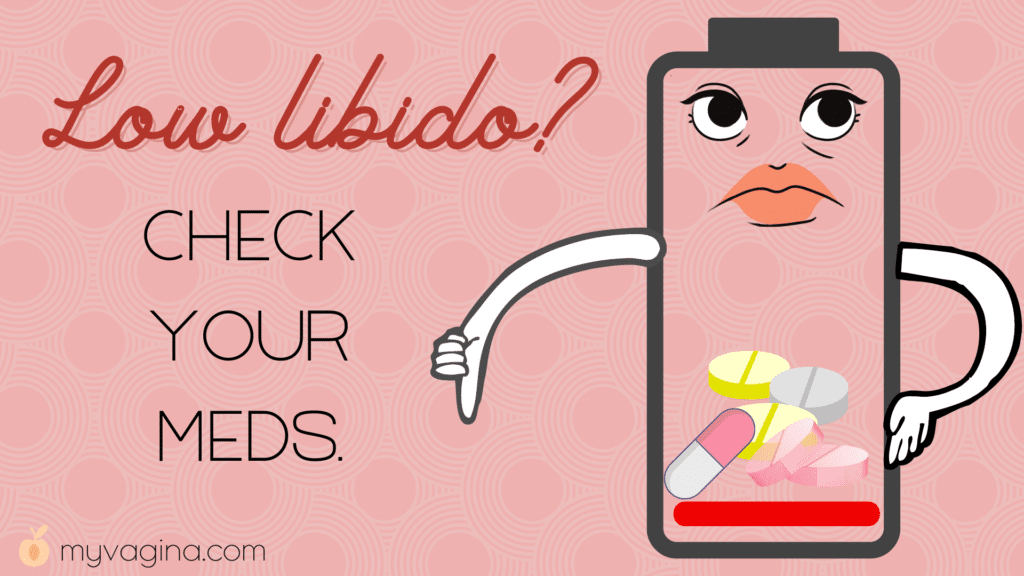Drug-induced sexual dysfunction in women is common amongst those on medication, with the worst offenders being high blood pressure meds, antidepressants, antipsychotics, and anti-androgens.
Every medication has the possibility of adverse impacts, but the impact on one’s sex life is not necessarily often discussed. Having your drugs mess up your sex drive means you are less likely to take your drugs, but make sure you talk it over with your doctor before you do anything rash, because there might be more options.
Recreational drugs also impact sexual function, so don’t discount those as having an impact either.
The normal sexual response
To understand how a woman should react to sexual stimuli, you need to understand a normal sexual response. This is the phases of sexual desire, arousal, and orgasm.
Low desire, lack of swelling and lubrication, anorgasmia, and painful sex can all be the result of one or many of these phases being interrupted.
Prescription drugs that affect sexual function
Antihypertensives
Sexual dysfunction often appears in women before they are treated with hypertension medication, compared to women with normal blood pressure – that worked out in one study1 to be 42 per cent of women with hypertension and sexual dysfunction compared to 19 per cent in women with normal blood pressure.
Adverse impacts on erectile function (swelling and lubrication) have been found in both men and women. There are many tissue similarities in both sets of genitalia, and the most commonly reported issues are decreased sexual desire and decreased sexual pleasure.
Alpha adrenergic drugs (clonidine, prazosin) also may reduce desire and arousal. Angiotensin II receptor antagonist, valsartan, was associated with increases in sexual desire and sexual fantasies when compared with atenolol, a beta blocker, in hypertensive women.
Alpha blockers, ACE inhibitors and calcium channel blockers are not thought to cause sexual dysfunction, and angiotensin II receptor antagonists could possibly improve sexual function. Beta-1 selective beta blockers (nebivolol) could help.
Antidepressants
Sexual problems are famously associated with antidepressant medication. Selective serotonin reuptake inhibitors (SSRIs) and serotonin noradrenaline reuptake inhibitors (SNRIs) can quickly interrupt sexual desire, cause problems with erectile tissue (which women have), and cause decreased vaginal lubrication.
Up to 70 per cent of those taking these drugs have problems with orgasm, as in, they don’t have one.
Tricyclic antidepressants are known to stymy sexual desire and orgasms. The drug effect will depend on its mode of action, so clomipramine causes orgasm problems in up to 90 per cent of patients, while nortriptyline causes more erectile dysfunction, but leaves orgasms out of it.
Monoamine oxidase inhibitors are linked to sexual dysfunction, too, but moclobemide has been rumoured to actually increase sexual desire.
Venlafaxine and mirtazapine vary in their negative sexual impact. Agomelatine was found to be a very good antidepressant and has fewer sexual side effects, but there have been conflicting reports on this. Sildenafil may be able to reverse poor vaginal lubrication and delayed orgasm in SSRIs.
Antipsychotics
Some antipsychotics are worse than others, and there are no studies on antipsychotic-induced sexual dysfunction in women, though this is a commonly-reported side-effect.
In studies of men (which can often be transferrable due to the tissue similarities), issues with erections, orgasms, and low libido were common. Women report low desire, difficulty achieving orgasm, poorer-quality orgasms, and an inability to orgasm.
Painful sex (dyspareunia), when related to oestrogen deficiency (atrophic vaginitis), can result in problematic sexual encounters. Galactorrhoea – milky nipple discharge – may be experienced in both men and women on antipsychotics.
Schizophrenia studies found that in those with low sexual desire, ziprasidone was preferable to olanzapine.
Most antipsychotics cause sexual dysfunction by blocking dopamine receptors, resulting in hyperprolactinemia and the suppression of the hypothalamic-pituitary-ovarian (HPO) axis. This causes problems with sexual desire, arousal, and orgasm.
Interference with these axes can also cause periods to stop and loss of ovarian function, which causes oestrogen deficiency and a dry, irritated vagina (atrophic vaginitis). Other neurotransmitter pathways (histamine, noradrenergic, and cholinergic) may be interfered with by antipsychotics.
Antiepileptics
Those on antiepileptic medication often experience sexual dysfunction, with gabapentin and topiramate both associated with dysfunction of orgasm and libido.
Oral contraceptive pills and the injection
Oral contraceptives decrease free testosterone, which is one way desire is reduced – at least in theory.
The Depo Provera injection can cause weight gain, depression, vaginal atrophy and painful sex, accompanied by low libido in about 15 per cent of women on the injection.
Cancer treatments
Many cancer treatments lead to sexual dysfunction, either by physical impediments or loss of self-esteem.
Long-acting gonadotropin-releasing hormone agonists used in breast cancer result in a loss of ovarian function, which means a loss of oestrogen. This often results in low libido, vaginal atrophy, and orgasm issues.
Antiandrogens
Drugs that block androgenic activity include cyproterone acetate, cimetidine, digoxin and spironolactone. These drugs block sexual desire and affect arousal and orgasm in men and women.
Steroids
Prednisone, an anti-inflammatory steroid drug, is known to result in low serum testosterone, reducing sexual desire.
Immunosuppressants
Sirolimus and everolimus, immunosuppressive drugs used in kidney transplants, can cause ovarian failure.
Other nonprescription drugs that can cause sexual dysfunction
- Antihistamines
- Pseudoephedrine
- Opioids
- Recreational drugs
What to do if you think drugs are ruining your sex life
The first step is to talk to your doctor, and see if there is a way to switch the drugs up a bit in dose or brand/type to see what happens. In psychoactive drugs, the process may be difficult or slow, since shifting meds can result in unexpected or unwanted consequences. Getting the drugs right for your brain may mean suffering sexual problems, which is a trade-off, and not a pleasant one. But there are options.
- Drug holidays
- Drug switching
- Dose reduction
Don’t change your dose or medication without consulting your doctor.
References
- 1.Doumas M, Tsakiris A, Douma S, et al. Beneficial effects of switching from beta-blockers to nebivolol on the erectile function of hypertensive patients. Asian J Andrology. Published online March 2006:177-182. doi:10.1111/j.1745-7262.2006.00076.x







